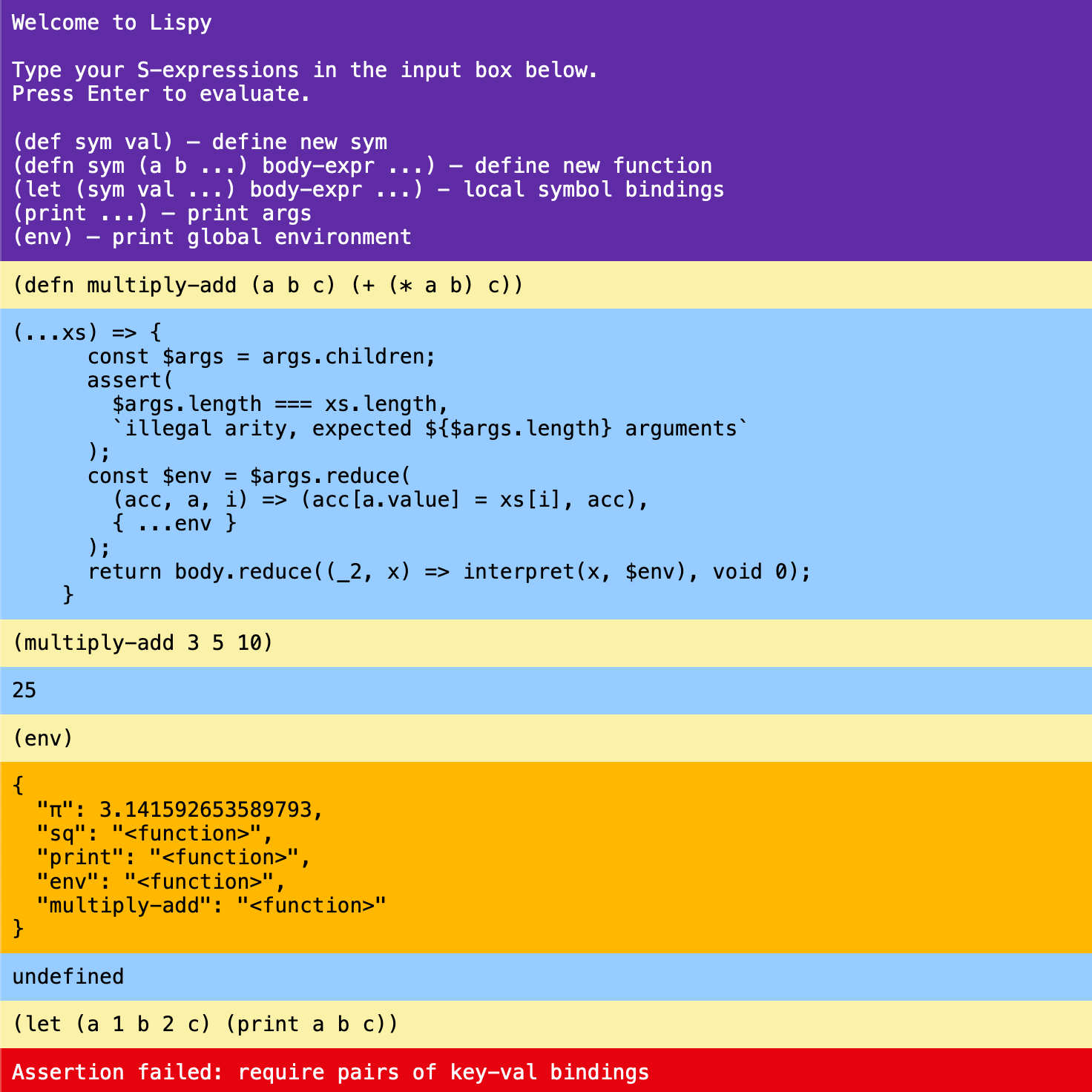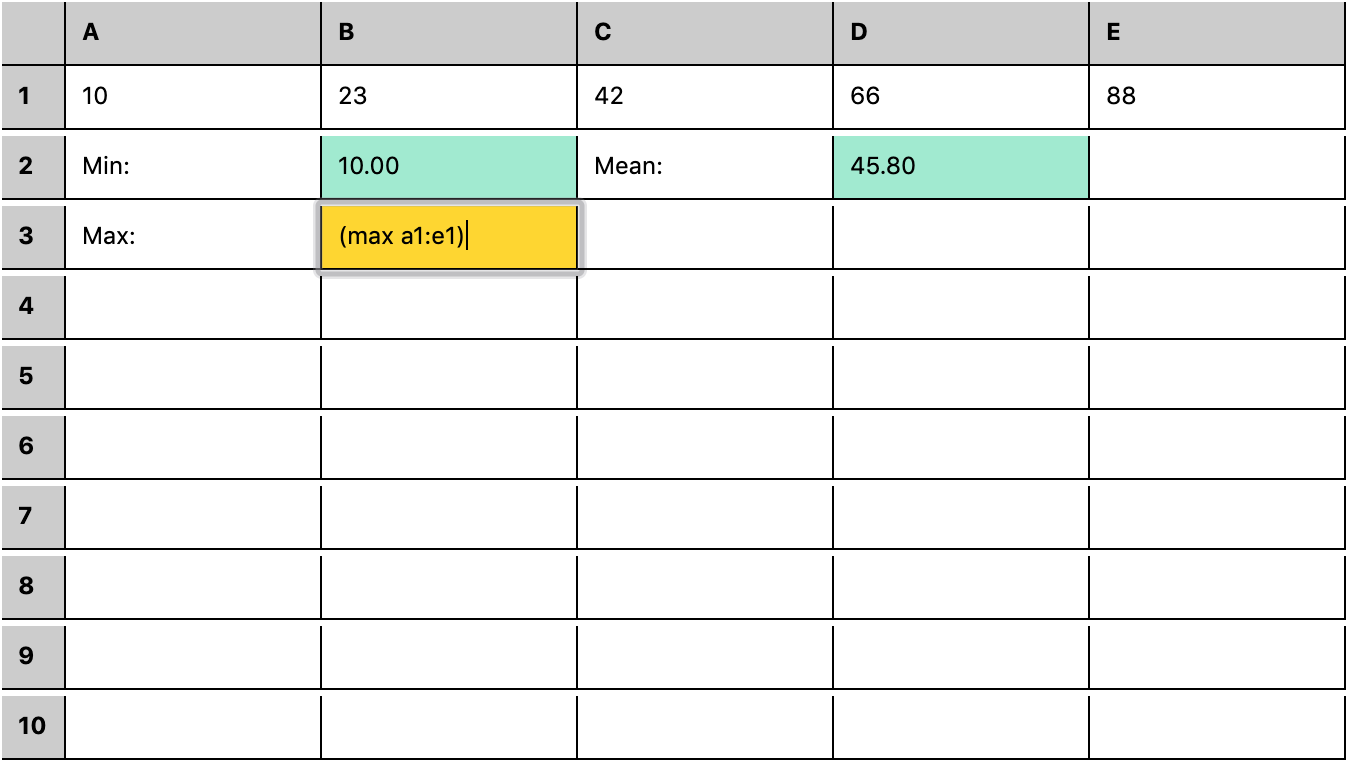Note
This is one of 199 standalone projects, maintained as part of the @thi.ng/umbrella monorepo and anti-framework.
🚀 Please help me to work full-time on these projects by sponsoring me on GitHub. Thank you! ❤️
Basic, but configurable and extensible S-Expression tokenizer, parser, AST builder and runtime / interpreter skeleton for custom, sandboxed DSL implementations.
The following default syntax rules are used:
- whitespace: space, tab, newline, comma
- expression delimiters:
(,) - numbers: any float notation valid in JS, hex ints prefixed w/
0x - string delimiters:
" - line comments:
;
Everything else is parsed as is, i.e. as symbol.
ALPHA - bleeding edge / work-in-progress
Search or submit any issues for this package
- @thi.ng/parse - Purely functional parser combinators & AST generation for generic inputs
yarn add @thi.ng/sexprESM import:
import * as sexpr from "@thi.ng/sexpr";Browser ESM import:
<script type="module" src="https://esm.run/@thi.ng/sexpr"></script>For Node.js REPL:
const sexpr = await import("@thi.ng/sexpr");Package sizes (brotli'd, pre-treeshake): ESM: 865 bytes
Note: @thi.ng/api is in most cases a type-only import (not used at runtime)
Two projects in this repo's /examples directory are using this package:
| Screenshot | Description | Live demo | Source |
|---|---|---|---|
 |
Browser REPL for a Lispy S-expression based mini language | Demo | Source |
 |
rstream based spreadsheet w/ S-expression formula DSL | Demo | Source |
The tokenize function returns an iterator of tokens incl. location
details. Any whitespace is skipped and whitespace characters are
configurable.
import { tokenize } from "@thi.ng/sexpr";
[...tokenize(`(* (+ 3 5) 10)`)];
// [
// { value: '(', line: 0, col: 0 },
// { value: '*', line: 0, col: 1 },
// { value: '(', line: 0, col: 3 },
// { value: '+', line: 0, col: 4 },
// { value: '3', line: 0, col: 6 },
// { value: '5', line: 0, col: 8 },
// { value: ')', line: 0, col: 9 },
// { value: '10', line: 0, col: 11 },
// { value: ')', line: 0, col: 13 }
// ]The parse function takes a source string or iterable of tokens and
parses it into an AST.
import { tokenize, parse } from "@thi.ng/sexpr";
parse(tokenize(`(* (+ 3 5) 10)`));
// or directly from string
parse(`(* (+ 3 5) 10)`);{
"type": "root",
"children": [
{
"type": "expr",
"value": "(",
"children": [
{
"type": "sym",
"value": "*"
},
{
"type": "expr",
"value": "(",
"children": [
{
"type": "sym",
"value": "+"
},
{
"type": "num",
"value": 3
},
{
"type": "num",
"value": 5
}
]
},
{
"type": "num",
"value": 10
}
]
}
]
}The below code example implements a small Lisp-like language, complete with interpreter and can be used an the basis for an easily extensible (and more optimized) setup. Even this barebones implementation allows for defining of symbols & functions, lexical scoping, FFI via providing externally defined functions via the global environment, variadic math ops...
import type { Fn, Fn2 } from "@thi.ng/api";
import { DEFAULT, defmulti, type MultiFn2 } from "@thi.ng/defmulti";
import {
parse, runtime,
type ASTNode, type Expression, type Implementations, type Sym
} from "@thi.ng/sexpr";
// evaluator: parses given source string into an abstract syntax tree (AST) and
// then recursively executes all resulting AST nodes using the
// `interpret()` function defined below. Returns the result of the last node.
const $eval = (src: string, env: any = {}) =>
parse(src).children.reduce((_, x) => interpret(x, env), <any>undefined);
// build runtime (interpreter) w/ impls for all AST node types. the generics are
// the types of the custom environment and the result type(s) of expressions.
// this is a multiple-dispatch function (see thi.ng/defmulti) which chooses
// implementations based on the AST node type
const interpret = runtime<Implementations<any, any>, any, any>({
// for expression nodes (aka function calls) delegate to builtins
// (implementations are defined further below)
expr: (x, env) => builtins(x.children, env),
// lookup symbol's value (via its name) in environment
sym: (x, env) => env[x.value],
// strings and numbers evaluate verbatim
str: (x) => x.value,
num: (x) => x.value,
});
// another multiple-dispatch function for DSL builtins. we will call this
// function for each S-expression node and it will delegate to the actual impl
// based on the expression's first item (i.e. a symbol/fn name)
const builtins: MultiFn2<ASTNode[], any, any> = defmulti((x) => x[0].value);
// helper function which interprets all given AST nodes and returns an array of
// their result values
const evalArgs = (nodes: ASTNode[], env: any) =>
nodes.map((a) => interpret(a, env));
// helper function for basic math ops variable arity.
// with 2+ args: (+ 1 2 3 4) => 10
// and special cases for 1 arg only, i.e.
// `(+ 2)` => 0 + 2 => 2
// `(- 2)` => 0 - 2 => -2
// `(* 2)` => 1 * 2 => 2
// `(/ 2)` => 1 / 2 => 0.5
const mathOp =
(fn: Fn2<number, number, number>, fn1: Fn<number, number>) =>
([_, ...args]: ASTNode[], env: any) => {
const first = interpret(args[0], env);
return args.length > 1
? // use a reduction for 2+ args
evalArgs(args.slice(1), env).reduce((acc, x) => fn(acc, x), first)
: // apply special case unary function
fn1(first);
};
// implementations of built-in core functions
builtins.addAll({
"+": mathOp((acc, x) => acc + x, (x) => x),
"*": mathOp((acc, x) => acc * x, (x) => x),
"-": mathOp((acc, x) => acc - x, (x) => -x),
"/": mathOp((acc, x) => acc / x, (x) => 1 / x),
// count returns the length of first argument (presumably a string)
// (e.g. `(count "abc")` => 3)
count: ([_, arg], env) => interpret(arg, env).length,
// concatenates all args into a space-separated string and prints it
// returns undefined
print: ([_, ...args], env) => console.log(evalArgs(args, env).join(" ")),
// defines as new symbol with given value, stores it in the environment and
// then returns the value, e.g. `(def magic 42)`
def: ([_, name, value], env) =>
(env[(<Sym>name).value] = interpret(value, env)),
// defines a new function with given name, args and body, stores it in the
// environment and returns it, e.g. `(defn madd (a b c) (+ (* a b) c))`
defn: ([_, name, args, ...body], env) => {
// create new vararg function in env
return (env[(<Sym>name).value] = (...xs: any[]) => {
// create new local env with arguments bound to named function args
// (i.e. simple lexical scoping)
const $env = (<Expression>args).children.reduce(
(acc, a, i) => ((acc[(<Sym>a).value] = xs[i]), acc),
{ ...env }
);
// execute function body with local env, return result of last expr
return body.reduce((_, x) => interpret(x, $env), <any>undefined);
});
},
// add default/fallback implementation to allow calling functions defined in
// the environment (either externally or via `defn`)
[DEFAULT]: ([x, ...args]: ASTNode[], env: any) => {
const name = (<Sym>x).value;
const f = env[name];
if (!f) throw new Error(`missing impl for: ${name}`);
return f.apply(null, evalArgs(args, env));
},
});
// testing our toy Lisp DSL...
// define symbol and use in another expression
$eval(`(def chars "abc") (print (count chars) "characters")`);
// 3 characters
// define function (multiply-add) and test
$eval(`(defn madd (a b c) (+ (* a b) c)) (print (madd 3 5 (* 5 2)))`);
// 25
// pre-define function via environment, then use in DSL
$eval(`(print (join " | " (+ 1 2) (* 3 4) (- 5 6) (/ 7 8)))`, {
join: (sep: string, ...xs: any[]) => xs.join(sep),
});
// 3 | 12 | -1 | 0.875
// testing lexical scoping...
// function `foo` has `a` as local (with precedence over global) binding,
// but function `bar` correctly uses binding of the outer env, even if
// called from `foo`...
$eval(`
(def a 1)
(defn foo (a) (print "foo" a "bar" (bar)))
(defn bar () (+ a 1))
(print "root #1" a)
(foo 100)
(print "root #2" a)
`);
// root #1 1
// foo 100 bar 2
// root #2 1See test/ for a more in-depth version of this example...
import { parse } from "@thi.ng/sexpr";
// define syntax overrides (keep default whitespace rules)
const syntax = {
scopes: [["<", ">"], ["{", "}"]],
string: "'"
};
console.log(JSON.stringify(parse(`<nest { a '2' b 3 }>`, syntax), null, 2));Resulting JSON output:
{
"type": "root",
"children": [
{
"type": "expr",
"value": "<",
"children": [
{
"type": "sym",
"value": "nest"
},
{
"type": "expr",
"value": "{",
"children": [
{
"type": "sym",
"value": "a"
},
{
"type": "str",
"value": "2"
},
{
"type": "sym",
"value": "b"
},
{
"type": "num",
"value": 3
}
]
}
]
}
]
}If this project contributes to an academic publication, please cite it as:
@misc{thing-sexpr,
title = "@thi.ng/sexpr",
author = "Karsten Schmidt",
note = "https://thi.ng/sexpr",
year = 2019
}© 2019 - 2024 Karsten Schmidt // Apache License 2.0



